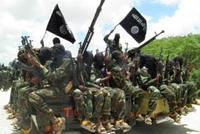-
Morocco changes offer U.S. “very important opportunity”
Homeland Security NewsWire’s Executive Editor Eugene K. Chow recently had the opportunity to chat with Robert M. Holley, the executive director of the Moroccan American Center for Policy; in their interview Holley discusses the implications of Morocco’s recent historic elections, the likely policies of the newly elected moderate Islamist party, and the broader consequences of the Arab Spring in Egypt and Libya
-
-
British military gears up to secure 2012 Olympic Games

As London gears up for the 2012 Olympic Games, event organizers and government officials have spared no expense on security measures to ensure the safety of the hundreds of thousands of athletes, spectators, and VIPS attending the six week event which begins on 27 July
-
-
State Department launches new Bureau of Counterterrorism
Last week, the State Department announced that its counterterrorism office has been upgraded to a “full-fledged bureau”
-
-
Al Qaeda wants to be your “friend” and “follower”

Hackers attacking databases is just one facet of online terrorist activity; international terrorist organizations have shifted their Internet activity focus to social networks and today a number of Facebook groups are asking users to join and support Hezbollah, Hamas, and other armed groups that have been included in the West’s list of declared terror organizations
-
-
Thirty U.S. car dealers caught in Hezbollah terror-financing scheme

Thirty used car dealerships in the United States are currently under investigation for their part in an international money laundering scheme that sent roughly $300 million to the known terrorist organization Hezbollah
-
-
Al Qaeda leaders fleeing to North Africa
Reports from senior British military officials indicate that al Qaeda’s top leaders are moving out of Pakistan and into North Africa potentially in an attempt to avoid casualties from the U.S. drone campaign or as a broader shift in strategy
-
-
FBI’s eGuardian integrated with Memex Patriarch
Deployed over the last three years, FBI eGuardian is a nationwide Suspicious Activity Reports (SARs) system focused on counterterrorism tips and leads; the agency has now integrated eGuardian with Patriarch Intelligence Management Platform from Memmex
-
-
Terrorists using sophisticated uni-directional bombs
Terrorists have learned to develop increasingly sophisticated explosives as evidenced by the uni-directional bombs detonated last week in Karachi, Pakistan that killed three Pakistan Rangers and injured several others
-
-
Minnesota banks to stop money transfers to Somalia

In an effort to cut off funds to Somali terrorists, banks in Minnesota will no longer support money transfers via local businesses called “hawalas”; Minnesota has the largest concentration of Somalis in the United States and officials fear that money sent from relatives living in the United States could be funding terrorist groups like al Shabaab
-
-
White House offers details of plans to fight homegrown terrorism
The White House yesterday unveiled a broad, new strategy to battle homegrown terrorism in the United States. The program empowers communities by teaching local officials to recognize violent extremism and see the threat as a public safety issue, like the battle against gangs and drugs. The 20-page White House strategy, entitled “Strategic Implementation Plan for Empowering Local Partners to Prevent Violent Extremism in the United States,” adds details to the outline the administration released four months ago.
-
-
The threat to military communities inside the United States

The Majority Staff of the House Committee on Homeland Security has released a report on threats to the security of military communities in the United States; the report says that 70 percent of the plots against military targets occurred since mid-2009 — including the two successful homeland attacks since 9/11
-
-
Safer fertilizer technology

Honeywell will build a facility in California to produce a fertilizer with the agronomic benefits of traditional nitrate-based fertilizers, but with significantly lower explosive potential; the new fertilizer was independently tested, with guidance from the DHS and the Bureau of Alcohol, Tobacco, Firearms and Explosives, and demonstrated significantly less or no explosive power
-
-
Nigerian Islamist terrorists and U.S. security
Boko Haram is an Islamist religious sect that formed in the northern part of Nigeria, Africa’s leading oil producer, in 2002. Its Hausa-language name means “Western education is sin.” The group’s continuing attacks on Western targets in Nigeria and a death toll reaching 330 people in 2011 have made U.S. lawmakers and security experts take notice.
-
-
CIA terror plot-tracking technology is intriguing, worrisome
A program developed by Palantir Technologies for PayPal is now used by intelligence and law enforcement agencies. It allows the CIA to detect a terrorist plot in the making, and do so without subjecting the general public to intrusive measures.
-
-
Indiana sheriffs use video conferencing to reduce costs
In an effort to reduce costs, officials in Tippecanoe County, Indiana have begun using video conferencing technology to hold court hearings without transporting the defendant to the courtroom
-
More headlines
The long view
How Male Grievance Fuels Radicalization and Extremist Violence
Social extremism is evolving in reach and form. While traditional racial supremacy ideologies remain, contemporary movements are now often fueled by something more personal and emotionally resonant: male grievance.
